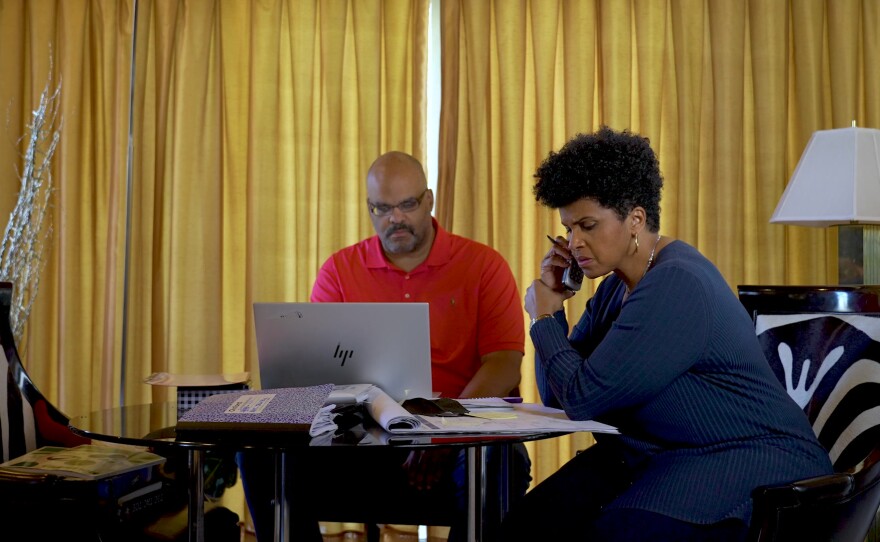The Affordable Care Act brought “value-based” care, meant to improve both quality and cost of medical services. But could there be unintended consequences that lead some patients to hospice and the end of life sooner than they wish?
Is an overwhelmed healthcare system referring people too hastily? And are advocates available to make sure their loved ones’ last days respect their final wishes?
TRANSCRIPT FROM VIDEO
ARCHIE HARRIS: Okay, bye-bye.
ANGIE MILES: Kelly and Archie have been through this before. The brother and sister work closely along with caregivers to oversee the needs of their mother, who's almost 90 years old.
KELLY HARRIS-BRAXTON: We have the best mother ever. Sweet, loving, and she deserves the best.
ARCHIE HARRIS: She does.
KELLY HARRIS-BRAXTON: And it's our priority to make sure that she gets the best.
ANGIE MILES: Because they want her final days to be comfortable and pain free, they're using hospice services.
KELLY HARRIS-BRAXTON: When our father was ill, he went to the hospital, we had a family meeting and they said, "I'm sorry, Mr. Harris; there's nothing more we can do for you." And my dad, I remember him saying, "Well, I don't feel like I'm dying. I don't feel that sick." He was very clear at that time, and he was gone three weeks later. But when he came home, we did bring hospice in.
ANGIE MILES: The Harris' know that their mother wishes to stay in her home of 50 years, and hospice with regular check-in visits and ready advice by phone, is part of the plan that makes this possible. Hospice is a form of palliative care. That's care focused on limiting suffering and improving quality of life without aggressive medical interventions and curative treatments. And in many cases, previously prescribed medications as well. Hospice is used primarily by seniors and is intended for those with terminal illnesses not expected to live more than six months.
[ROB ANTHONY SINGING] Well I'm near the end ♪ ♪ And I just ain't got ♪
ANGIE MILES: Wisconsin-based musician, Rob Anthony, wants the world to know about his mother Judy's unexpected return to life after what seemed certain death in hospice.
ROB ANTHONY: I said, "Well, you don't have high blood pressure. Why don't we take you off this medication and see what happens? You're on hospice care. You got nothing to lose now, everything to gain. And I swear, within three, four weeks, her breathing got better, she was up and moving like, no problem. Back to her regular self.
ANGIE MILES: Anthony says he believes people are dying prematurely and unnecessarily because of a well-meaning but overwhelmed healthcare system that's sending people to hospice when they might actually recover. This Virginia couple uses the word "miracle" to describe Shelley's total paralysis, predicted death, and return to life, after contracting West Nile virus in Powhatan
SHELLI WHITEHURST: I ended up with complete paralysis. Including my eyes were paralyzed, everything was paralyzed. And in the hospital, they didn't know what was wrong with me. They kept trying things. There most certainly was pressure from the hospital to put me in hospice, to turn off the ventilator, because there was no quality of life according to them. I wasn't a person; I was just a blob laying there.
ANGIE MILES: The Whitehursts are concerned that people are too quick to accept a medical prognosis that leaves them hopeless and unwilling to fight for life.
FRANK WHITEHURST: We've got doctors that are telling her she's never going to get better, but I've got a therapist that's saying, "No, we're going to get you out of bed and make you work."
SHELLI WHITEHURST: If you don't have family fighting for you when you're in the hospital, they're just going to do what they want to do because they aren't willing to wait for you to get better. And lots of diseases require wait time. If they're having the doctors tell 'em constantly, "Oh, you're never going to get better," it makes you think, "Maybe they know what they're talking about." 'Cause we expect that doctors know what they're talking about.
ANGIE MILES: There's a general consensus that hospice affords people a better death. One that's free of uncomfortable and invasive procedures and that might allow them to die at home. Hospice deaths also have the potential to save hospitals money and earn hospice companies money, which raises some ethical concerns about who is being referred to hospice and why?
JOEL KUPFER: When I see patients, I'm really seeing one patient at a time. My focus really should be on that one patient and what's best for that patient.
ANGIE MILES: A decade ago, cardiologist Joel Kupfer, wrote this editorial. It appeared in The Journal of the American Medical Association. The Affordable Care Act ushered in value-based incentives meant to improve care and lower costs. There are financial benefits to hospitals if certain patients with serious illnesses don't die or re-admit to a hospital within 30 days of treatment. However, ...
JOEL KUPFER: If a person came into the emergency room with a heart attack and they were placed into hospice care within 24 hours of admission, they would be excluded from the metric. So, you can imagine that if death or the risk of mortality was fairly high, hospitals would be incentivized to move those patients quickly into hospice care.
ANGIE MILES: Has this happened? Since the introduction of value-based financial incentives for hospitals, there has been much higher enrollment in hospice care, up by more than 20 million people each year. There don't appear to be any studies that indicate hospitals referred patients to hospice for financial reasons, but there are families and health professionals who've raised concern that hospitals may be under pressure to make this kind of choice.
JOEL KUPFER: In an attempt to improve value in our healthcare system, we introduced these ideas, which on their surface may seem very good to someone who's not involved the healthcare.
ANGIE MILES: And there are studies that suggest the 30-day re-admission rule led to seriously ill patients returning for treatment but being kept in a hospital emergency room or held for observation only, instead of being re-admitted and impacting a hospital's bottom line. One difficult aspect of hospice enrollment is determining whether an admission was appropriate or not. Patients under hospice care, especially those in facilities run by providers or their partners, sometimes receive medications intended to alleviate pain. Drugs that make patients drowsy or disoriented inhibit their ability to eat, drink, and communicate, increasing the likelihood of death. The National Institutes of Health lists the most commonly used drugs in hospice. The top three are acetaminophen, commonly known by the brand-name Tylenol, lorazepam, which is a powerful benzodiazepine used to treat anxiety, and morphine, a narcotic derived from opium. Depending on how they're used, these drugs can provide comfort for the dying but also render people who are not necessarily on the verge of death, unable to perform the functions necessary to stay alive. Drugs can hinder the ability to have communication or any meaningful interaction with loved ones in the final days.
ARCHIE HARRIS: You have to have people who love you, people who care and who get along. And that way the patient has, you know, a much better chance of living and living well, and enjoying the last stages of their life, as opposed to ending up in a bed somewhere stuck between the mattress and the railing and not knowing what's going on.
KELLY HARRIS-BRAXTON: When you have strong advocates, you don't have to be a lawyer, but you can make great decisions. You just have to have information. You have to educate yourself. You have to ask lots of questions.
ARCHIE HARRIS: Always.
KELLY HARRIS-BRAXTON: And that's what we did. We asked lots of questions. When we didn't like the answers, we made a different choice.
ANGIE MILES: For the Whitehursts, the Anthonys and for the Harris family, the recommendation is the same. Talk about end of life plans well in advance. Write an advanced directive so there's no confusion about what you want if facing a serious, even terminal, illness. And educate yourself about the possible benefits of hospice care, but also the potential drawbacks if you don't fully understand what happens when you make that choice.








